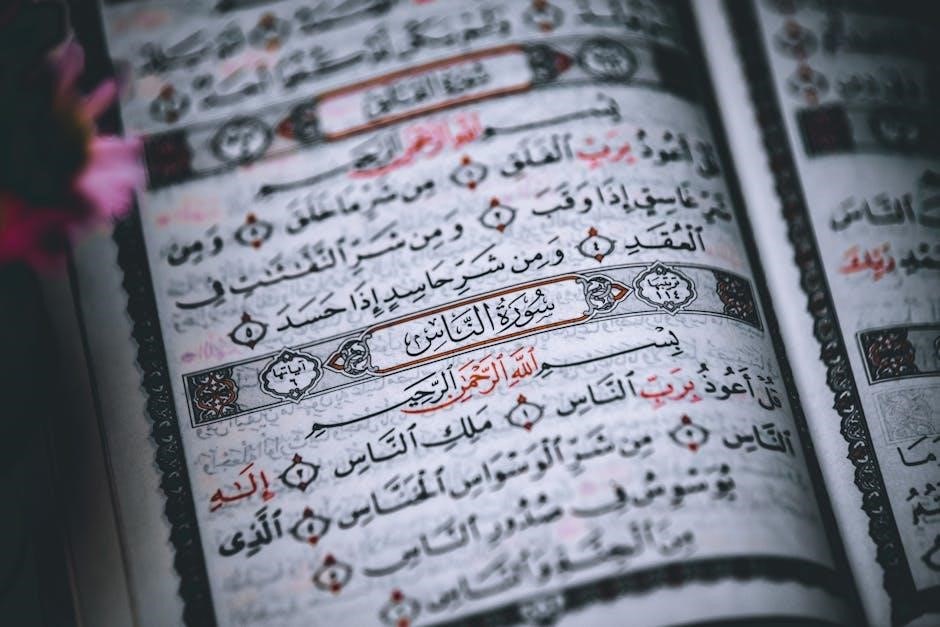Surah Naba, the 78th chapter of the Quran, is a Meccan surah with 40 verses. It emphasizes the Day of Judgment, divine power, and moral guidance, offering profound spiritual insights.

Overview of Surah Naba
Surah Naba, the 78th chapter of the Quran, is a Meccan surah with 40 verses, classified in the 30th Para. It is titled “The Tidings,” highlighting its significance.
2.1. Historical Context and Classification
Surah Naba is a Meccan surah, revealed during the Prophet Muhammad’s time in Mecca. It is part of the 30th Juz and consists of 40 verses. The surah emphasizes themes like the Day of Judgment and divine power, serving as a moral and spiritual guide. Its classification as a Meccan surah highlights its focus on monotheism and the afterlife, typical of early Quranic revelations. The surah’s structure and content reflect its purpose of awakening faith and providing divine wisdom to the people of Mecca during a transformative period in Islamic history.
2.2. Structure and Composition
Surah Naba is a Meccan surah, comprising 40 verses and 2 rukus. It is located in the 30th Juz of the Quran, making it accessible for recitation and study. The surah’s structure is concise yet profound, blending themes of divine power, moral guidance, and the afterlife. Its composition reflects the early Meccan period, focusing on monotheism and the Day of Judgment. The surah’s rhythmic and poetic style enhances its recitation, while its content provides deep spiritual and ethical insights. Its placement in the Quran highlights its importance as a source of wisdom and reflection for believers. The surah’s structure is designed to inspire contemplation and faith.

Themes and Verses of Surah Naba
Surah Naba explores themes of the Day of Judgment, divine power, and moral guidance. It emphasizes accountability, God’s sovereignty, and ethical conduct, providing spiritual and existential insights.
3.1. The Day of Judgment and Afterlife
Surah Naba vividly describes the Day of Judgment, highlighting its inevitability and grandeur. It depicts the resurrection, accountability, and the ultimate fate of souls, emphasizing the afterlife’s eternal nature. The surah warns against disbelief and immorality, urging believers to prepare for the Hereafter. Verses illustrate the chaos of the Day, with the heavens and Earth in turmoil, and humanity gathered for reckoning. The distinction between Paradise and Hell is clear, with the righteous rewarded and the wicked punished. This theme serves as a reminder of divine justice and the ultimate consequence of human deeds, fostering piety and reflection.
3.2. Signs of the Divine Power
Surah Naba highlights the signs of Allah’s divine power through natural phenomena and creation. It references the heavens, Earth, mountains, and rivers as testaments to His might. The surah emphasizes the creation of humanity, the alternation of night and day, and the submission of the Sun, Moon, and stars to divine order. These signs serve as reminders of Allah’s wisdom and authority. The surah also underscores the resurrection of life from death, illustrating His power over existence and nonexistence. By reflecting on these signs, believers are encouraged to acknowledge Allah’s sovereignty and the perfection of His creation, fostering a deeper connection to faith and divine wisdom.
3.3. Moral and Spiritual Guidance
Surah Naba offers profound moral and spiritual guidance, urging believers to reflect on their actions and cultivate righteousness. It emphasizes gratitude for Allah’s blessings and warns against arrogance and greed. The surah calls for a balanced life, avoiding excessive worldly pursuits while striving for spiritual growth. It highlights the importance of justice, compassion, and humility, encouraging believers to uphold these values in their daily lives. The surah also underscores the significance of self-reflection and prayer, reminding individuals to seek Allah’s forgiveness and guidance. By adhering to these teachings, believers can attain a deeper connection with their faith and lead a more purposeful existence.
The Importance of Surah Naba in Islam
Surah Naba holds significant importance in Islam as it serves as a vivid reminder of the Hereafter and divine justice. It emphasizes the inevitability of the Day of Judgment, motivating believers to reflect on their deeds and seek righteousness; The surah is also a source of comfort, reinforcing faith in Allah’s mercy and power. Its teachings encourage gratitude for divine blessings and warn against complacency in worldly pursuits. Reciting Surah Naba is considered a blessed act, offering spiritual growth and a deeper understanding of Islamic values. It remains a central text for guiding believers toward a balanced and virtuous life, aligning with key Islamic principles of justice, compassion, and accountability.

Translations and Interpretations of Surah Naba
Surah Naba is widely translated into languages like Malayalam and Urdu, offering accessible interpretations for diverse audiences. These translations facilitate deeper understanding and spiritual reflection globally.
5.1. Malayalam Translation
The Malayalam translation of Surah Naba is a valuable resource for those fluent in the Malayalam language, enabling them to comprehend the divine message more profoundly. This translation is widely available online, allowing individuals to download and read Surah Naba in Malayalam PDF format conveniently. It serves as a bridge for Malayalam-speaking communities to engage deeply with the spiritual teachings and reflections of the surah. The translation maintains the essence of the original Arabic text while making it accessible to a broader audience, fostering a deeper connection with the Quranic wisdom and its timeless truths.
5.2. Urdu Translation
The Urdu translation of Surah Naba is widely accessible, providing a meaningful way for Urdu-speaking individuals to engage with the Quranic text. Platforms like UrduPoint offer easy downloads of Surah Naba in PDF format, ensuring convenience for learners and readers. This translation helps bridge the gap for those who prefer reading in Urdu, making the divine message more relatable and understandable. It is a valuable resource for personal study, reflection, and spiritual growth, allowing individuals to deepen their connection with the teachings of Surah Naba in a language they are comfortable with. This accessibility fosters a stronger bond with the Quran’s timeless wisdom.

Downloading Surah Naba PDF
Surah Naba PDF is easily downloadable from platforms like UrduPoint, offering high-quality formats for offline reading and study. It is free and conveniently accessible online.
6.1. Arabic Text with English Translation
The Surah Naba PDF often includes the Arabic text alongside its English translation, making it accessible for bilingual readers. This format preserves the original scripture’s beauty while providing comprehension for non-Arabic speakers. The PDFs are meticulously formatted, ensuring clarity and readability. Many versions feature parallel columns or interlined text for easy reference. This dual-language presentation is particularly beneficial for those seeking to understand the Quran’s teachings deeply. Additionally, some PDFs include transliterations, aiding individuals in pronouncing Arabic verses correctly. These resources are widely available on platforms like UrduPoint and others, offering a seamless learning experience for Muslims worldwide.
6.2. High-Quality PDF Formats
High-quality Surah Naba PDFs are available for download, featuring crisp Arabic text and clear layouts. These formats ensure readability on various devices, with adjustable font sizes for comfort. Many PDFs are designed with large, bold fonts to enhance visibility, especially for those who prefer bigger text. Some versions include annotations or footnotes for deeper understanding. Platforms like UrduPoint offer high-resolution downloads, ensuring the text remains sharp when zoomed in. These PDFs are compatible with smartphones, tablets, and computers, making them versatile for personal study or teaching purposes. The high-quality formatting preserves the sacred text’s integrity, providing an optimal reading experience for all users.
Benefits of Reading and Studying Surah Naba
Reading and studying Surah Naba offers profound spiritual and intellectual benefits. It deepens understanding of the Day of Judgment and the afterlife, fostering a sense of accountability. The surah’s emphasis on divine power and creation inspires awe for Allah’s majesty. Regular recitation nurtures moral integrity, guiding believers toward righteousness. It also provides solace in times of hardship, reinforcing trust in Allah’s plan. Engaging with Surah Naba strengthens faith, encourages reflection, and helps develop a routine of Quranic study. Its teachings on justice and mercy offer timeless wisdom, enabling believers to live with purpose and mindfulness.

Key Verses and Their Meanings
Surah Naba contains several key verses that highlight its central themes. Verse 2 speaks of the Day of Judgment, emphasizing its inevitability. Verse 6 addresses resurrection, reassuring believers of Allah’s promise. Verses 12-14 describe Paradise, offering hope to the righteous. Verse 31 warns against arrogance, urging humility and gratitude. Verse 36 underscores the consequences of disbelief, while verse 39 calls believers to patience and trust in Allah. These verses collectively convey the surah’s focus on accountability, divine justice, and the ultimate reward for faith and righteousness.
Cultural and Historical Significance
Surah Naba holds profound cultural and historical significance as a Meccan revelation, emphasizing the Day of Judgment and divine justice. It serves as a reminder of accountability, influencing Islamic thought and ethics. The surah’s vivid descriptions of the afterlife have shaped Muslim beliefs about the hereafter. Historically, it has been a source of comfort and guidance during challenging times. Its themes of moral responsibility and divine power resonate deeply in Islamic culture, inspiring art, literature, and spiritual practices. The surah’s recitation is often sought for solace and reflection, making it a cherished part of Muslim traditions and daily worship.

Recitation and Reflection
Reciting Surah Naba is a deeply spiritual act, offering believers a moment for introspection and connection with divine wisdom. The surah’s vivid imagery of the Day of Judgment invites readers to reflect on their deeds and ultimate accountability. Its verses, rich in moral and eschatological themes, encourage self-reflection and a commitment to righteous living. Many Muslims incorporate Surah Naba into their daily prayers or personal devotion, finding solace in its reminders of divine mercy and justice. Reflecting on its teachings fosters gratitude, humility, and a deeper understanding of life’s purpose. The surah’s recitation is also a means of seeking spiritual comfort and guidance in times of uncertainty.
Surah Naba, the 78th chapter of the Quran, is a profound Meccan surah comprising 40 verses. It vividly depicts the Day of Judgment, emphasizes divine power, and provides moral guidance. The surah’s themes of accountability and mercy inspire reflection and spiritual growth. Its availability in PDF formats, including Arabic text with English translations, facilitates easy access for learners and devotees worldwide. Reading and studying Surah Naba offers deep insights into Islamic teachings and fosters a stronger connection with faith. Its recitation and reflection are highly recommended for personal spiritual development and understanding of life’s ultimate purpose.
